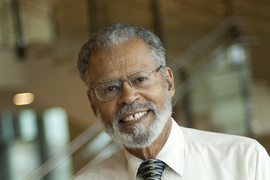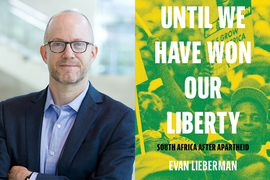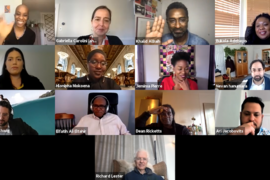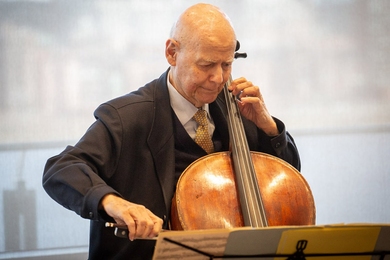Willard R. Johnson, a professor emeritus in the MIT Department of Political Science who focused his scholarly research on the political development of Africa, died in late October at age 87. Johnson served as a member of the MIT faculty for nearly 60 years, while also founding and participating in numerous civic initiatives aimed at making political and social advances in Africa and the U.S., and building engagement between the two regions.
Johnson joined the political science faculty in 1964 as an assistant professor. He was the first Black faculty member at MIT to rise through the ranks and achieve tenure from within, and he created a broad portfolio of accomplishments. Johnson conducted extensive fieldwork in Africa, published important contributions to the study of African political institutions and independence movements, advocated for the inclusion of more Black scholars in the MIT community, and served as a leading voice at MIT and in the Boston area against South Africa’s apartheid.
Johnson also held visiting positions at Harvard Business School, Boston University, and the Fletcher School of Law and Diplomacy at Tufts, in addition to his time as a faculty member and emeritus professor at MIT.
Johnson was born in St. Louis, Missouri, in 1935 and moved to Pasadena, California, where he graduated from Muir High School. He earned his AA from Pasadena City College in 1955, and a BA in international relations from the University of California at Los Angeles (UCLA), in 1957. At UCLA, he served as student body president, and also helped to found the campus’ chapter of the NAACP. Notably, he was also responsible for bringing W.E.B. Dubois to campus as a speaker. Johnson later received his MA degree in African studies with distinction from Johns Hopkins School of Advanced International Studies, in 1961, and his PhD in political science from Harvard University, in 1965.
Johnson’s Harvard dissertation, “Cameroon Reunification: The Political Union of Several Africas,” formed the basis of his first book, published as “The Cameroon Federation” by Princeton University Press in 1970. In a review of the book in the Journal of Modern African Studies, W. Norman Haupt wrote, “This carefully prepared book is based upon a sound, objective understanding of local facts and preferences,” while noting that it “is filled with those minute details of history which make for exciting reading.”
Johnson himself would say that his most important accomplishment while at UCLA was meeting his wife, Vivian Johnson. They not only formed a lasting bond in marriage, but also became scholarly collaborators and jointly published “West African Governments and Volunteer Development Organizations: Priorities for Partnership” (University Press of America, 1990). Political scientist Pearl T. Robinson of Tufts University called it “required reading for anyone seeking insights into the struggles that are being waged to promote increased political pluralism and alternative development strategies in contemporary Africa.”
Johnson remained impressively active in politics and public service throughout his life. From 1968 to 1970, he took a leave from MIT to serve as executive director of Circle, a Roxbury, Massachusetts-based community development organization. In 1972, he directed the Africa Policy Task Force for the George McGovern for President committee, and served on the Democratic Party Advisory Council’s Foreign Affairs Study Group. He also served on the U.S. National Committee for the United Nations Educational, Scientific, and Cultural Organization (UNESCO).
Johnson later became a leading voice at MIT, and nationally, in the anti-apartheid movement. He led the Boston chapter of TransAfrica’s Free South Africa Movement. As Johnson noted, in an interview for the Department of Political Science’s 50th anniversary celebration, he was arrested, along with Nobel laureate George Wald of Harvard and other local luminaries, at an anti-apartheid rally in Boston. Johnson was proud to be actively involved in Nelson Mandela's visit to Boston in 1990, part of the anti-apartheid leader’s momentous trip to the U.S.
In 1991, a few years before stepping down from his faculty position, Johnson founded the Kansas Institute for African American and Native American Family History, which promotes the preservation and documentation of family identity, traditions, and accomplishments of members of the African American and Native American communities of the Midwest.
Johnson’s 2001 paper published in the Black History Bulletin, “Tracing Trails of Blood on Ice: Commemorating ‘The Great Escape’ of 1861-62 of Indians and Blacks into Kansas,” chronicled a significant episode in this underexplored regional history. He remained active with the Kansas Institute for African American and Native American Family History until his passing.
Johnson also founded the Boston Pan-African Forum, a group promoting mutually beneficial relations between the United States and the people of Africa, and remained an active part of it throughout his later years.
Throughout his time at MIT, Johnson was an active voice in support of diversifying the Institute faculty and student community, and pushing for greater opportunities for Black faculty and students alike. Johnson was proud of the accomplishments of Institute students such as Georgia Persons PhD ’78, a political scientist who is now a professor in the School of Public Policy at Georgia Tech; and Marsha Coleman-Adebayo PhD ’82, a leading advocate against workplace discrimination whose experiences helped generate passage of the Notification and Federal Employee Anti-discrimination and Retaliation Act, signed into federal law in 2002.
In seeking to build stronger ties between scholarly communities, Johnson also initiated a joint seminar in political science between MIT and Howard University, in the mid-1970s, an effort concluding with combined class session for all the participating students from both institutions.
Johnson remained a visible presence in the political science department following his transition to professor emeritus in 1996. Colleagues fortunate enough to cross paths with him were greeted with a tremendously warm smile. Those who knew him during his time on the faculty have fond memories of him stopping by their offices to check in, inquire about family members, and give the distinctive encouragement and kind understanding which, through his extraordinary experience and character, only he could offer.












